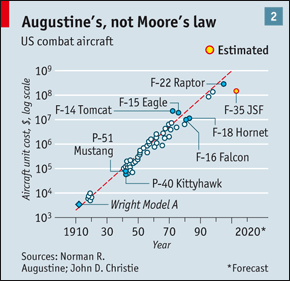When I was writing in the previous post about Alberto Dubois idea of evolution being exponential I had in mind the book “Augustine’s Laws”, to which I have referred many times in this blog.
Today, I read a very good article in last week’s issue of The Economist, “Defence spending in a time of austerity”, which describes the current situation of defence budgets around the World and how it will affect many programmes…
The article itself is referring to the computing evolution depicted by Dubois and some other exponential trends identified by Augustine, such as the increased use of computer power and software.
I especially liked the update of Augustine’s chart for the Law XVI which says:
“In the year 2054, the entire defence budget will purchase just one aircraft. This aircraft will have to be shared by the Air Force and Navy 3½ days each per week except for leap year, when it will be made available to the Marines for the extra day.”
Thus, in the last 25 years, since Augustine wrote his book, the business has not improved much. This situation provokes that different countries have to share weapons, e.g., C-17 transport aircraft (Strategic Aircraft Capability, operated for several countries from Hungary), SALIS (“Strategic Airlift Interim Solution”, chartering of ex-soviet An-124 to NATO countries)…
One of the most striking situations that may come to happen is that UK and France share two aircraft carriers. Carriers were considered essential to have control over oceans… however, if France is going to scale its fleet down to one single carrier: what would happen during the long months when it will be in overhaul?
Lately there have been much discussion about this sharing scheme, though it is still denied by officials. Consider that just back in 1940, the British Royal Navy destroyed much of the French fleet in the Operation Catapult.
Other interesting point is the trend towards using unmanned aircraft versus piloted ones. Already in the “Aircraft Investment Plan Fiscal Years (FY) 2011-2040” (PDF, 0.2MB) that the US Air Force submitted together with its FY11 budget request, it forecasted that the number of unmanned aircraft will almost triple in the next ten years, while the rest of fleets would be either just renewed or decreased.
Nevertheless, this may never come to happen if we take Augustine’s Law Number XIV:
“After the year 2015, there will be no airplane crashes. There will be no takeoffs either, because electronics will occupy 100 percent of every airplane’s weight”.




